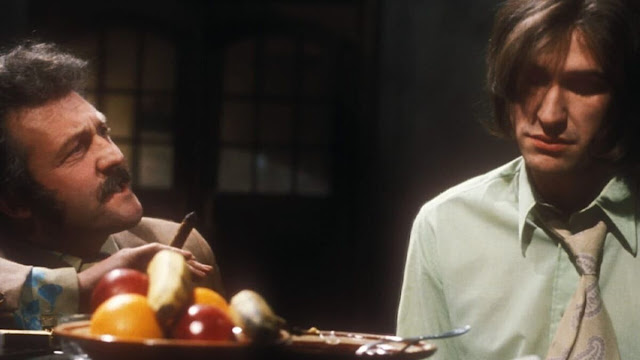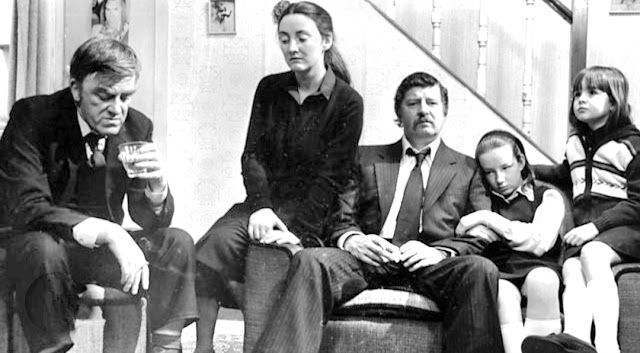Play for Today No. 1 - The Long Distance Piano Player, by Alan Sharp, broadcast October 15, 1970
Zoë:
As a lifelong fan of Ray Davies I was thrilled when Phil B suggested that we start this blog by watching the first ever Play for Today, which starred arguably the most famous member of the Kinks. The play was broadcast in October 1970 which I think means Davies must have been about 26 years old at the time that it was made. I am sorry to say that, after witnessing his performance, albeit through the smudgy lens of decaying video imagery, I understand why he did not go on to take the world of cinema by storm.
I wonder if Alan Sharp, the author of The Long Distance Piano Player was inspired by They Shoot Horses Don’t They, which came out the year before and concerns a dance marathon and anomie. Perhaps for him it seemed perfectly reasonable to substitute a rainy northern English town for Santa Monica and a single piano player (Davies) for a varying cast of characters. Or possibly he was inspired by Alan Sillitoe's The Loneliness of the Long Distance Runner, which came out in 1962.As Sharp died in 2013, we will never know exactly what led him to decide to write a play for television about a young man, Pete, (Davies), who, because he can’t think of anything better to do, has agreed to try to play the piano non-stop for four days and nights in a dreary hall hired by his manager, Jack, (Norman Rossington) who is English but for some reason lapses into an American accent from time to time. The young pianist (who during the whole production never plays a single piece of music worth listening to) has recently married a holiday camp beauty contestant called Ruthie, (Lois Daine). The play revolves around a tug-of-war for Pete's soul, (such as it is), between his manager and his wife.
Nothing in the play made sense to me. The situation remained unbelievable despite my best efforts to suspend my disbelief. Outdoor shots of blank faced northerners staring glumly at the camera, wet pavements and grimy brickwork are scattered through the action in what I suspect was an attempt to inject some reality into the production. They, along with the interludes where the billiard table cleaners go about their work, were the moments I found most interesting, but they didn’t really help to make the play itself a success.
One problem, I thought, was the characterisation. The agent, for example, was a ridiculous figure, and his plan was absurd. His argument was that the lives of the people in the town are little and therefore they will be attracted by big things. He may be right about the absence of big things, but I don’t think Ray Davies playing hours of boring piano music with sticking plasters protecting his fingers is anyone’s idea of a transcendent experience. Meanwhile, Ruthie, the wife, is pretty and needy, and nothing more - except possibly occasionally telepathic. Alf, (an incidental character played by James Hazeldine) is even more flimsy, and the central character, the piano player, is the least developed of the lot. The best that can be said of him is that he has a childhood memory of once seeing a fox with his best friend, who later died of TB. While this allows Sharp to establish foxes as emblems of something or other, it doesn’t really add to our understanding of anything – at least not my understanding. The only hint we get that Pete has any preference for anything, (including his own wife – how they married is impossible to imagine), comes in a baffling sequence right at the play’s beginning where he wanders the streets, apparently in search of something. I am sorry to say that I am so vulgar I assumed he was looking for a prostitute, but it turned out he was hunting down a huge ice cream sundae. Judging from the way he ate it, the sundae may have been standing in for my more risque assumption – I don’t know what was and was not allowed on television back in 1970.
All in all, if I’m honest, the play was a complete waste of time, although it was interesting to note that when the local gang of hoodlums is shown trying to cause trouble, their number includes a sort of Jimi Hendrix lookalike, which may be an early hint of the BBC’s fondness for diversity casting. I suppose I should recognise that being stripped of my illusion that Ray Davies is groovy made the whole thing worthwhile, provided you believe that people should live austerely without illusion, which is debatable.
SPOILER ALERT: If you can’t be bothered to watch the play yourself – and really I’m not sure it is worth the bother – you may still want to know whether the piano player character managed to achieve his goal of playing non-stop for four days and nights. The answer is: no, he didn’t. Instead, on the evening of possibly the third day (or maybe only the second), he falls from his piano stool, drags himself out of the building and down its rather grand front stairs, collapsing at last into the arms of his wife, who has hurried back from the cinema, having I think somehow guessed that he will need her.
In the final scene, Pete (Davies) lies sprawled across the pavement as Ruthie supports him. He raises his head and speaks the play's final line, a remark that confirms, were there any doubt, that this is definitely an English play. “It’s raining”, he gasps and up come the credits, rolling against a backdrop of foxes playing in a glade.
Phil: I don't have very much to add to the very comprehensive review above, except to make a public apology for subjecting Zoë to this lamentable affair. On paper it looked like a surefire winner, with Ray Davies in his first major acting role and a script by an acclaimed young writer called Alan Sharp, who later went on to have a successful career in Hollywood. However, in spite of the frenetic energy of Davies's pianistic dance of death, the play is completely lifeless.
Davies's character, Pete, comes across as a sort of Dostoyevskian Holy Fool, but that may be the result of a style of acting that one could charitably call "naturalistic." He passively complies with the demands of his domineering manager, who seems speaks and behaves as if he's a boxing coach in a 1950s Hollywood B movie. The script acknowledges that the accent is an affectation, but by then I had already lost all faith in the credibility of Norman Rossington's character.
None of the other characters seem remotely believable either. Whether it's a group of flat-capped old men or a gang of hoodlums, they never progress beyond the role of a Greek chorus in a school production of Agamemnon.
None of the other characters seem remotely believable either. Whether it's a group of flat-capped old men or a gang of hoodlums, they never progress beyond the role of a Greek chorus in a school production of Agamemnon.
The play is full of unanswered questions. Why are Pete and his wife a married couple, when they seem as intimate as two strangers who are waiting for a bus? Why has Pete's manager chosen to stage this piano playing marathon in a remote town with few passers by? But most of all, I'd like to know how a play that was written by Alan Sharp and directed by Philip Saville manages to be so tedious.
There is an excellent and more sympathetic review here, but it also mentions the contemporary observation that the play was as much of of marathon for the viewer as the pianist. I wouldn't recommend watching this unless you want an object lesson in how not to make a compelling television drama.
There is an excellent and more sympathetic review here, but it also mentions the contemporary observation that the play was as much of of marathon for the viewer as the pianist. I wouldn't recommend watching this unless you want an object lesson in how not to make a compelling television drama.



Comments
Post a Comment